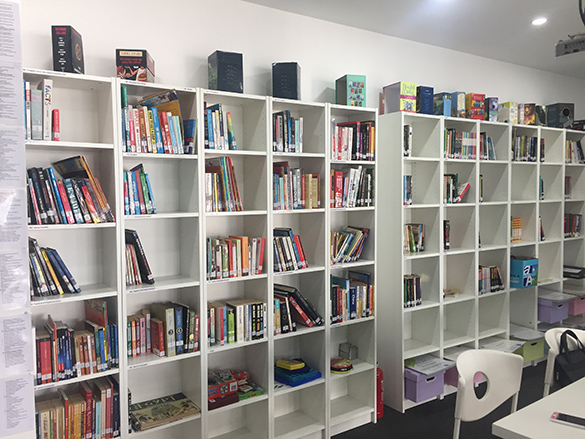Our Libraries

At Studio, we think that every child deserves a serious library – one that is rich, vital, accessible, dynamic, and challenging.
When we read and teach about the splendours of the classical world, we conjure images of sunken cities, plundered palaces, and fallen statuary. It is remarkable to discover, then, that amidst the long catalogue of irreplaceable treasures is a library, whose loss was mourned as deeply as any fallen empire.
In its time, the Library of Alexandria was a repository of texts and a gathering space for scholars. Dedicated to the muses of the Greek pantheon, it was a place that embodied social virtue, achievement, and learning as facets of a full life, anchored in a community of readers. It was erected in a time when books were a rare commodity, to be safeguarded and stockpiled. This period has passed, but the importance of the library as an exalted space has endured.
There is something essential about the physicality of the library: the happy accident of a misplaced title that leads a patron in an unanticipated direction; the creases and marks of another reader, which place your own encounter into a larger history when you discover them. And then there is the sheer quantity of paper, the sensation of being physically surrounded by thoughts both numerous and specific. It reminds us that we, too, are physical even in the midst of a world of ideas – it intimates that ideas have specific weight, heft, relation, and limits. A good library envelops us, both academically and physically.
Studio’s library aims to expose our students to exemplary works of literature across the categories of books available in our world. The collection of materials is guided by a master list of approximately five thousand titles written by prominent and decorated authors, works whose publication was pivotal in the unfolding of literary history and criticism. Our collection will comprise both physical and eBooks, just as our courses are offered in both physical and virtual formats. Always, our mission is to bring access to students across the world to great teaching, great ideas, and great books.
Library reading means borrowing, means entering into a community and observing a history. It shows us books as connected to the world and to one another. And the way a library arranges books, in conversation with one another and in community, demands something from a reader of any age. It requires a response. In this way, library reading forms a reader into a writer. Books, in conversation with other books, spark conversation between people. Perhaps this is a clue as to why libraries remain so central to a liberal arts education.
All of our students, whatever their particular enrolment, are issued library cards and become members of our library, allowing them to peruse and check out books both in-person and virtually. The library at Studio is the common room, the place at the heart of our work as a diverse community of learners.
